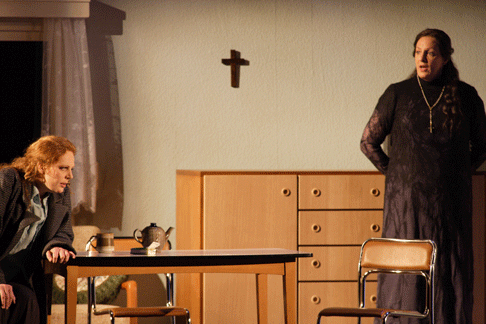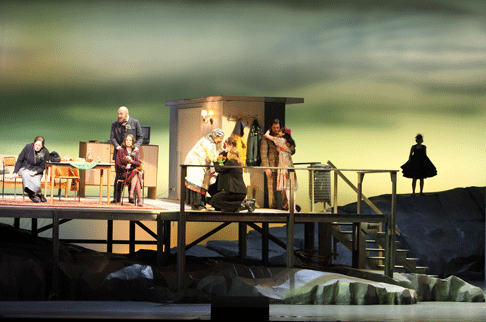22 Apr 2009
Jenůfa at the Bavarian State Opera
The Bavarian State Opera’s new production of Leos Janacek’s Jenufa is a feather in the cap of intendant Nikolaus Bachler.

The Bavarian State Opera’s new production of Leos Janacek’s Jenufa is a feather in the cap of intendant Nikolaus Bachler.
It opened April 8 at Munich’s Nationaltheater as part of his second season as director. His program presents a mix of both traditional productions and concept-driven, edgy regietheater repertory. But “traditional” does not mean “old-school.”
Formerly director of Vienna’s famed Bergtheater, Bachler was aware of stage director Barbara Frey’s work and his invitation for her to stage Jenufa, her first opera, was a gamble that paid off. She took the story of lost love and infanticide to heart and her taut reading makes the story both searing drama and epic tragedy.
Based on a story, Jeji Pastorkyuna (Her Stepdaughter), by Gabriellla Preissova, it is a relatively early opera by Janacek but marks him emphatically as a master of musical drama and is now performed regularly on the world’s major opera stages. It is the story of a young girl, who gives her name to the opera, and her love affair with the town dandy, Steva. Pregnant with his child, she bears the child in secret while he sows his oats and avoids entanglements. Her high-strung, widowed step-mother, Kostenicka, increasingly unhinged, drowns the baby, which is later discovered by the townspeople. Jenufa is immediately accused but Kostenicka confesses and Jenufa goes through with her marriage to the hapless but devoted Laca.
The setting, an open house on stakes, was designed by Bettina Meyer, and served to concentrate the tension of this dangerously dysfunctional family drama. The crowds who appear outside with the discovery of the body of the love child in the lake, scramble over the forbidding rocks in this desolate landscape. Staging, costumes and lighting all contribute to the sense of desolation which permeates this drama. Slightly updated - wind turbine towers are in the background and a cheap TV is on the table - the small town claustrophobia is easily understood by contemporary audiences.
Bachler was generous with the assembled voices to bring this off. The blazing work of soprano Eva-Maria Westbroek has generated much press recently and, in the title role, her desperate love for a feckless young man, Steva, could not be more heart-wrenching. Gifted with one of the most passionate and powerful voices of today, her anguish was palpable.
There was a sure chemistry between her and her step-sister, Kostenicka, played to perfection by the veteran soprano Deborah Polaski. Watching these two professionals relate was the high-point of the evening. Canadian Joseph Kaiser, with a clear, expressive tenor, was convincing as young Steva. Tenor Stefan Margita, has made his disturbing, complex reading of Laca a simply indispensable part of this opera. It was a quartet of talent that created an intensity rarely experienced on the opera stage. The secondary characters, all excellent, including opera legend Helga Dernesch, now 70, as the grandmother. Sometimes wayward of tone, her character was theatrically on target.
 Eva-Maria Westbroek and Deborah Polaski
Eva-Maria Westbroek and Deborah Polaski
It was a fine night also for Kirill Petrenko who lead the opera orchestra and chorus with a vivid sense of musical expression. His career is taking off in the last few years with major appearances in the pit at New York, Paris, Vienna and London and his galvanizing leadership contributed to the seamless night of high-voltage music making.
The opera is playing now at the Bavarian State Opera’s National Theater through April 27 and will be seen again as part of the Munich Opera Festival on July 9. Information, with pages in English, is at http://www.bayerische.staatsoper.de/.
Frank Cadenhead
 Scene from Jenůfa
Scene from Jenůfa